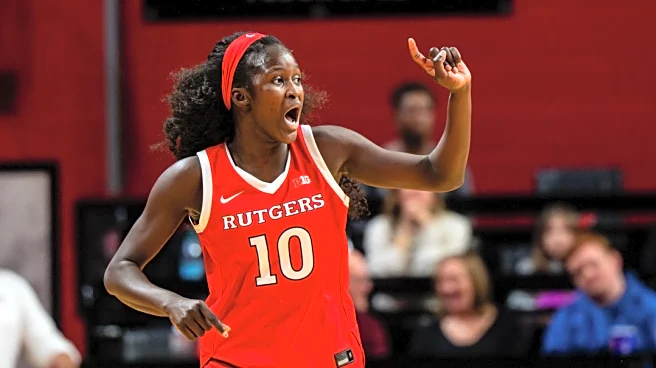What's Happening?
The Los Angeles Dodgers, fresh off their back-to-back World Series victories against the Toronto Blue Jays, have lost a key player to their division rivals, the San Francisco Giants. Justin Dean, who played a pivotal role in the Dodgers' championship
run as a pinch runner and defensive replacement, was placed on waivers and subsequently claimed by the Giants. Dean's heads-up play in Game 6, where he signaled a lodged ball, was crucial in preventing the Blue Jays from gaining control of the series. Despite his limited appearances, Dean's contributions were significant in securing the Dodgers' dynasty status, marking their third World Series win in six years.
Why It's Important?
The transfer of Justin Dean to the San Francisco Giants is significant for several reasons. Firstly, it highlights the competitive nature of MLB, where strategic player acquisitions can shift the balance of power within divisions. Dean's move to the Giants could bolster their defensive capabilities, potentially impacting the dynamics of the NL West division. For the Dodgers, losing a player who contributed to their recent success may require adjustments in their roster strategy. This development also underscores the challenges teams face in maintaining a dynasty, as key players may be lost to rivals, affecting team cohesion and performance.
What's Next?
As Justin Dean joins the San Francisco Giants, both teams will likely reassess their strategies for the upcoming season. The Dodgers may need to find suitable replacements to fill the void left by Dean's departure, while the Giants will aim to integrate him into their lineup effectively. This move could lead to increased rivalry between the two teams, with the Giants potentially gaining an edge in their matchups against the Dodgers. Fans and analysts will be watching closely to see how Dean's presence influences the Giants' performance and whether the Dodgers can maintain their dynasty status without him.
Beyond the Headlines
The transfer of Justin Dean to the Giants also raises questions about player loyalty and the business aspects of professional sports. Dean's move, following his crucial role in the Dodgers' World Series victory, highlights the transactional nature of MLB, where players can quickly shift allegiances based on team decisions. This development may prompt discussions on the ethical considerations of player trades and the impact on team morale and fan support. Additionally, it reflects the broader trend of teams leveraging strategic acquisitions to enhance their competitive edge in the league.















